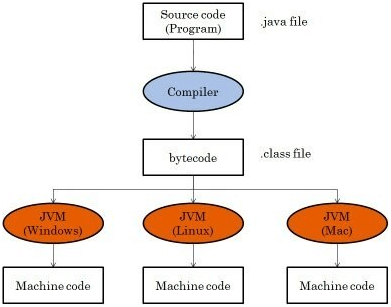What is Java Bytecode?Java bytecode is the instruction set for the Java Virtual Machine. It acts similar to an assembler which is an alias representation of a C++ code. As soon as a java program is compiled, java bytecode is generated. In more apt terms, java bytecode is the machine code in the form of a .class file. With the help of java bytecode we achieve platform independence in java. How does it works?When we write a program in Java, firstly, the compiler compiles that program and a bytecode is generated for that piece of code. When we wish to run this .class file on any other platform, we can do so. After the first compilation, the bytecode generated is now run by the Java Virtual Machine and not the processor in consideration. This essentially means that we only need to have basic java installation on any platforms that we want to run our code on. Resources required to run the bytecode are made available by theJava Virtual Machine, which calls the processor to allocate the required resources. JVM's are stack-based so they stack implementation to read the codes. 
Advantage of Java BytecodePlatform independence is one of the soul reasons for which James Gosling started the formation of java and it is this implementation of bytecode which helps us to achieve this. Hence bytecode is a very important component of any java program.The set of instructions for the JVM may differ from system to system but all can interpret the bytecode. A point to keep in mind is that bytecodes are non-runnable codes and rely on the availability of an interpreter to execute and thus the JVM comes into play. Bytecode is essentially the machine level language which runs on the Java Virtual Machine. Whenever a class is loaded, it gets a stream of bytecode per method of the class. Whenever that method is called during the execution of a program, the bytecode for that method gets invoked.Javac not only compiles the program but also generates the bytecode for the program. Thus, we have realized that the bytecode implementation makes Java a platform-independent language. This helps to add portability to Java which is lacking in languages like C or C++. Portability ensures that Java can be implemented on a wide array of platforms like desktops, mobile devices, severs and many more. Supporting this, Sun Microsystems captioned JAVA as "write once, read anywhere" or "WORA" in resonance to the bytecode interpretation. |
 For Videos Join Our Youtube Channel: Join Now
For Videos Join Our Youtube Channel: Join Now
Feedback
- Send your Feedback to [email protected]
Help Others, Please Share









